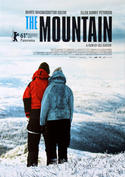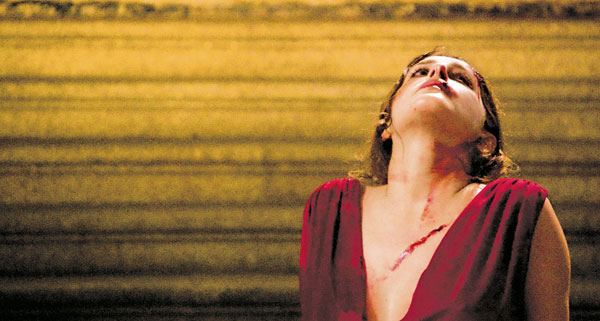Documentar despre o planetă necunoscută - The New World
Giulia Ghica Dobre
Men's Health, septembrie 2008
Terence Malik, ultimul poet de la Hollywood, îşi începe povestea despre Pocahontas ca şi cum ar face un documentar despre o planetă necunoscută.
Avem pe de-o parte europenii care debarcă în Virginia la 1600, şi indienii care le apar în faţă. Două specii îngheţate de uimire în faţa stranietăţii celuilalt. Se salută, fac schimb de sunete de neînţeles, de mişcări magice. Printre englezi, John Smith (Colin Farrell), un soldat aventuros şi indisciplinat, căruia i se va cere să urce râul în căutare de alimente. Indigenii însă îl capturează şi aproape că l-ar fi linşat, dacă nu ar fi intervenit tânăra prinţesă Pocahontas (sublima debutantă Q'orianka Kilcher, 15 ani), fascinată de acel bărbat care vine dintr-o lume îndepărtată.
John Smith, ca orice adult, se înmoaie în faţa atenţiilor repetate ale adolescentei şi uită rapid de misiune. Trăieşte idilic în satul indian, în prezentul cel mai pur, între băi la râu şi curse pe câmpurile de cereale. Când se întoarce la fortul englezesc, Pocahontas îl urmează, îndrăgostită. Smith, ca orice bărbat, preferă fuga din faţa responsabilităţii relaţiei, şi acceptă o misiune de cartograf pe teritoriile Canadei. Prinţesa indiană se vede dăruită de către destin cu un soţ englez bogat şi faimos, care o va transporta la curtea regelui britanic, şi alături de care va trăi la graniţa între exponat bizar de bâlci şi integrarea totală.
Precum în toate filmele lui Terrence Malik suntem ghidaţi în The New World de o voce dinafara cadrului, care comentează fapte şi senzaţii ale vieţii cu încântarea cu care s-ar descrie fabricarea manuală şi irepetabilă a unui obiect fragil şi preţios.
Precum în toate filmele sale, iubirea este o plonjare totală, natura o stăpână distantă şi maiestuoasă, iar oamenii sunt distraşi de la schimbul lor de violenţe reciproce doar de câte o durere ireparabilă şi hipnotică.
Precum în toate filmele sale, timpii naraţiunii sunt dilataţi enorm, iar peisajele şi sunetele sunt exclusiv naturale.
De ani întregi nu au mai existat filme care să redea atât de atractiv o civilizaţie visată (precum cea a indienilor americani).
Cum s-a scris în America, ceilalţi fac film, dar Malik clădeşte catedrale. E de-ajuns să consumăm secvenţa iniţială, cu sosirea caravelelor, acompaniată de întregul preludiu wagnerian de la Aurul Rinului, simbol al pierderii inocenţei acelor tărâmuri încă nepângărite de cupiditatea occidentală, sau împletirea amoroasă ca metaforă a destinului Lumii Noi. John Smith şi Pocahontas devin, în mâinile magice ale lui Malick, cei două poli în jurul cărora se aglutinează eternele conflicte umane între natură / cultură.
Să te pierzi în misterul reverberat al încadraturilor lui Malik este o experienţă total nevăzută, de frumuseţe şi disconfort.
The New World - USA 2006.
Un film de Terrence Malick.
Cu Christian Bale, Jason Aaron Baca, Colin Farrell, Ben Mendelsohn, David Thewlis, Q'Orianka Kilcher, Christopher Plummer, Jonathan Pryce
Avem pe de-o parte europenii care debarcă în Virginia la 1600, şi indienii care le apar în faţă. Două specii îngheţate de uimire în faţa stranietăţii celuilalt. Se salută, fac schimb de sunete de neînţeles, de mişcări magice. Printre englezi, John Smith (Colin Farrell), un soldat aventuros şi indisciplinat, căruia i se va cere să urce râul în căutare de alimente. Indigenii însă îl capturează şi aproape că l-ar fi linşat, dacă nu ar fi intervenit tânăra prinţesă Pocahontas (sublima debutantă Q'orianka Kilcher, 15 ani), fascinată de acel bărbat care vine dintr-o lume îndepărtată.
John Smith, ca orice adult, se înmoaie în faţa atenţiilor repetate ale adolescentei şi uită rapid de misiune. Trăieşte idilic în satul indian, în prezentul cel mai pur, între băi la râu şi curse pe câmpurile de cereale. Când se întoarce la fortul englezesc, Pocahontas îl urmează, îndrăgostită. Smith, ca orice bărbat, preferă fuga din faţa responsabilităţii relaţiei, şi acceptă o misiune de cartograf pe teritoriile Canadei. Prinţesa indiană se vede dăruită de către destin cu un soţ englez bogat şi faimos, care o va transporta la curtea regelui britanic, şi alături de care va trăi la graniţa între exponat bizar de bâlci şi integrarea totală.
Precum în toate filmele lui Terrence Malik suntem ghidaţi în The New World de o voce dinafara cadrului, care comentează fapte şi senzaţii ale vieţii cu încântarea cu care s-ar descrie fabricarea manuală şi irepetabilă a unui obiect fragil şi preţios.
Precum în toate filmele sale, iubirea este o plonjare totală, natura o stăpână distantă şi maiestuoasă, iar oamenii sunt distraşi de la schimbul lor de violenţe reciproce doar de câte o durere ireparabilă şi hipnotică.
Precum în toate filmele sale, timpii naraţiunii sunt dilataţi enorm, iar peisajele şi sunetele sunt exclusiv naturale.
De ani întregi nu au mai existat filme care să redea atât de atractiv o civilizaţie visată (precum cea a indienilor americani).
Cum s-a scris în America, ceilalţi fac film, dar Malik clădeşte catedrale. E de-ajuns să consumăm secvenţa iniţială, cu sosirea caravelelor, acompaniată de întregul preludiu wagnerian de la Aurul Rinului, simbol al pierderii inocenţei acelor tărâmuri încă nepângărite de cupiditatea occidentală, sau împletirea amoroasă ca metaforă a destinului Lumii Noi. John Smith şi Pocahontas devin, în mâinile magice ale lui Malick, cei două poli în jurul cărora se aglutinează eternele conflicte umane între natură / cultură.
Să te pierzi în misterul reverberat al încadraturilor lui Malik este o experienţă total nevăzută, de frumuseţe şi disconfort.
The New World - USA 2006.
Un film de Terrence Malick.
Cu Christian Bale, Jason Aaron Baca, Colin Farrell, Ben Mendelsohn, David Thewlis, Q'Orianka Kilcher, Christopher Plummer, Jonathan Pryce













